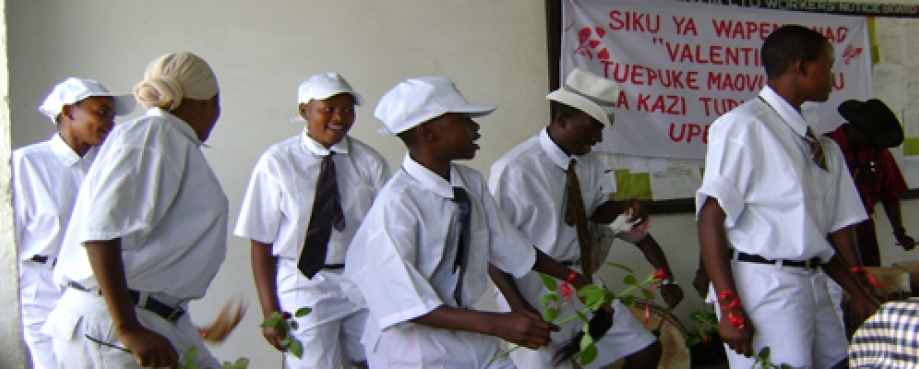
Valentine's Day is significant to some Tanzanians who know its meaning and buy roses or cards to for their lovers. But for many workers on the cut flower farms, Valentine's Day just means more work.
In the two weeks before, about 40% of the workers - especially graders, growers and drivers - work long hours to meet orders from customers, which sometimes come late. Most of them are women.
The majority are unable to buy flowers and cards to give to lovers. In fact, low income earners do not have the habit of buying flowers.
Empowering women workers
I work for a union called the Tanzanian Plantation and Agricultural Workers' Union (TPAWU) which is involved in a three-year project to empower women involved in East African horticulture. We want to help them to understand their rights; to develop confidence to claim their rights and improve their ability to negotiate for better working conditions; to fight injustices including unfair treatment, discrimination, harassment; and participate in decision-making.
We are already starting to notice some improvements in the lives of women workers on the cut flower farms. More than 90% of the horticulture farms are organized now, and workers' voices are heard. They have more awareness about their rights and are able to confidently negotiate with employers to improve their working and living conditions. The number of women in decision-making positions is increasing.
Managers are also benefiting from improved relationships with workers and the farms have formed a network of Human Resources Managers. Through this network, workers issues are effectively addressed.
A joint Collective Bargaining Agreement covering over 20 horticulture farms has also been concluded.
Using Valentine's Day to raise awareness
As part of our project we carry out many awareness-raising activities for women workers. Last year we used the opportunity of Valentine's Day to help raise awareness of workers' rights and responsibilities in five farms around Arusha.
We prepared awareness-raising messages capturing the meaning of Valentine's Day and how it relates to workers' rights and responsibilities. We printed the messages on banners and placed them in accessible places. The messages aimed to strengthen good relationships between workers and management, stressing the love between them, which could be explained in terms of compliance with labor legislation and company rules.
One banner said: ‘Valentine's Day workers should work hard and be faithful in order to get our rights. The second said: 'The day of lovers - Valentine's Day workers and employers strengthen love to improve production.'
A cultural group composed songs and traditional dance, which carried awareness-raising messages on the importance of Valentine Day to workers and management. The messages delivered through cultural dance and songs were both entertaining and educative.
The management provided roses and all workers gave them to their loved-ones. Cafeterias were decorated with balloons marked ‘Love'. Most of the workers wore red, a sign of love. Presents of sweets and biscuits were handed out. Some addresses were delivered by managers and TPAWU officials on the meaning of the day. It was a fun and an enjoyable event.
The management and workers' representatives committed themselves to maintain ‘love' by strengthening their relationship through compliance with labor legislation and ensuring workers' rights.
The workers have been talking about Valentine's Day ever since and want to organise something similar every year.
Things are by no means perfect on Tanzanian flower farms. For example, workers still earn far less than a living wage. We must continue to our efforts to support the new trade union structures and women's committees, and to help support the new Human Resources Network. We also need more research on reproductive health issues, to understand the effect of pesticides and chemicals applied on horticulture farms on the health of the workers.
But the fact that we are already seeing change as a result of our efforts is very positive.
